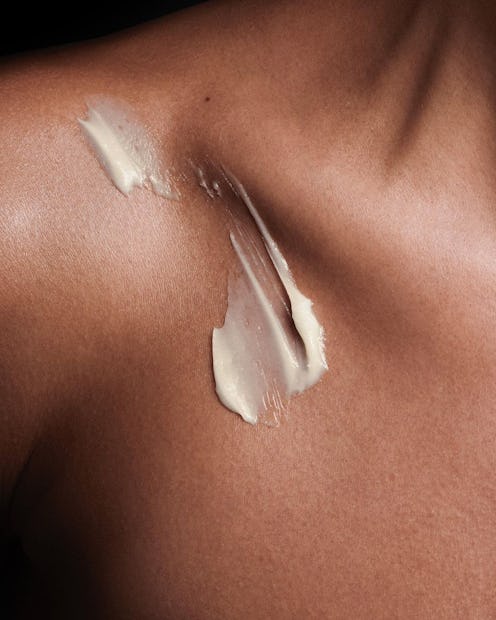(Skin)
Do You Really Need Retinol In Your Body Lotion?
Spoiler: Vitamin A works wonders all over.

Renowned for its ability to stimulate cell turnover and boost collagen, retinol, a grandchild of vitamin A, has earned its place as one of the most popular and effective anti-aging skin care ingredients on the market. It helps ramp up skin cell production, unclog pores, and exfoliate the skin, resulting in reduced visibility of wrinkles and a fresher, plumper, and more hydrated complexion over time. As the skin care industry continues to evolve, finally embracing a holistic approach that includes the scalp and body, it's no wonder that retinol-infused body lotions are taking center stage.
However, while retinol is revered by dermatologists and beauty editors as a must-have in any solid routine, for many, it’s a daunting ingredient. Whether it was an X-games mode formulation or simply forgetting to apply sunscreen afterward, you’ve probably either experienced your own retinol horror story or have come across them online. So as more and more body products start to supercharge their formulas with vitamin A, it begs the question: Do the rules change when it comes to using retinol body lotions?
Ahead, TZR spoke with two leading dermatologists as well as a cosmetic chemist to break down the basics of using retinol-infused body lotions, including shedding light on the safety of adding it to your daily routine.
The Skin Care Benefits Of Retinol-Infused Body Lotions
Retinol, whether used on the face or body, offers a multitude of benefits for the skin. "When applied to the body, retinol lotions work wonders by increasing skin cell turnover and gradually exfoliating dead, dry skin," says New York City-based board-certified dermatologist Dr. Kseniya Kobets, M.D. She explains that this process reveals a smoother and more even-textured complexion, which can be particularly helpful for addressing rough bumps like keratosis pilaris, often referred to as “strawberry skin” on the arms and legs.
She continues, telling TZR that as the skin undergoes this rejuvenation process, there can also be improvements in skin tone and pigmentation, especially associated with previous acne breakouts. While prescription retinoids are commonly used for body acne, retinol-infused lotions can be a great starting point for targeting active breakouts and treating and preventing resulting pigmentation.
As is the case with using the ingredient on your face, consistency is key when using retinol creams to achieve visible results — a marathon not a sprint. It's important to note that while retinol-infused lotions have their limitations in terms of firming effects, they work synergistically with proper sun protection, a healthy lifestyle, and in-office collagen-stimulating procedures to improve the overall appearance of the skin.
The Potential Side Effects Of Retinol Body Lotions
Retinol-infused body lotions may cause skin irritation, itching, scaling, and rashes. According to Dr. Kobets, “the skin on the body has a slower turnover rate and is typically drier than the face, so the side effects of topical retinoids can be more pronounced on the body, especially for sensitive skin.”
To minimize potential irritation, Ron Robinson, a cosmetic chemist and founder of BeautyStat Skincare, suggests starting with lower concentrations of retinol, such as 0.25%, and gradually increasing to 1% or higher. It is particularly important to be cautious around the sensitive eye area and begin with a lower percentage there. According to New York City-based board-certified dermatologist Dr. Dendy Engelman, M.D., FAAD, “Initial redness, itching, or burning caused by retinol typically diminish as the skin adapts to the treatment.” Using retinol in lotion form, depending on the ingredients, can help alleviate some of these irritating side effects.
What To Look For In A Retinol Body Lotion
"Retinol concentration in over-the-counter formulas can vary, so it's challenging to make direct comparisons," says Dr. Koberts. Instead, she emphasizes the importance of seeking products without fragrances, parabens, or extra preservatives, especially for sensitive skin. When choosing a body cream or lotion with retinol, she recommends looking for additional moisturizing ingredients like glycerin, ceramides, hyaluronic acid, niacinamide, peptides, and vitamins. This ensures that the lotion not only hydrates the skin immediately, but also works to build collagen over time with the retinol while minimizing potential side effects through hydration.
However, since the thickness of the skin varies across the body, it is important to adjust the percentage of retinol accordingly. Dr. Engelman advises, "More sensitive areas of the body should be given a lower percentage of retinol, as they are more prone to side effects such as redness, itching, or burning."
How To Incorporate Retinol Body Lotions Into Your Routine
When adding retinol body lotions to your routine, it's important to start slowly and observe how your skin responds. “As your skin adapts to the product, you can gradually increase usage,” advises Dr. Engelman. Although over-the-counter retinoids are generally milder and may not require as much caution, individuals with very sensitive or eczema-prone skin should still follow precautions, as mentioned by Dr. Koberts.
Sunscreen is always necessary, but it becomes even more crucial when using retinol. As vitamin A increases skin sensitivity to sunlight, it's essential to generously apply a broad-spectrum SPF 30 (or higher) sunscreen throughout the day.
Shop The Best Retinol Body Lotions
This article was originally published on